Stormont stalemate: Political leaders call for extra £1bn funds
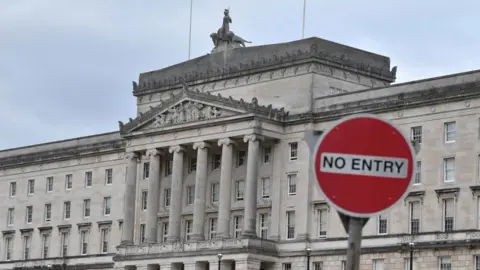 Charles McQuillan
Charles McQuillanStormont parties have said they will need at least £1bn of extra funding to manage budget pressures in a future executive.
They were speaking after meeting the head of the civil service to discuss the ongoing governance gap.
There is no functioning executive or assembly because of the DUP's protest against post-Brexit trade arrangements.
The party needs to "get off the fence" and return to government immediately, Sinn Féin's vice-president has said.
Michelle O'Neill was among party leaders who met Jayne Brady to discuss Northern Ireland's budget crisis and lack of government.
Her party is now the largest party in local government and the assembly having made gains in last week's council elections.
That result showed voters wanted power sharing to resume, said Ms O'Neill, saying suggestion that the Democratic Unionist Party (DUP) might return to power-sharing this autumn was "not an acceptable timeframe".
'Stem the bleeding'
In an earlier letter to the largest parties, Northern Ireland Civil Service boss Jayne Brady said Northern Ireland's budgetary pressures had been compounded by a "governance gap".
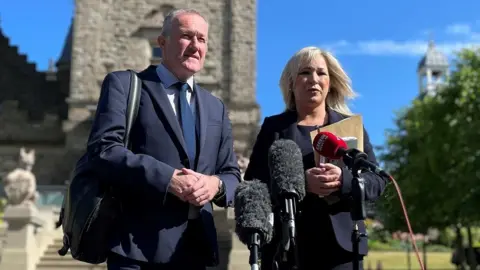 David Young/PA
David Young/PADUP leader Sir Jeffrey Donaldson described Thursday's meeting as productive, adding he was committed to working with other parties in asking for extra finances from Westminster.
"Our current funding formula for Northern Ireland doesn't work, what we need is a needs-based approach to our budget," he said.
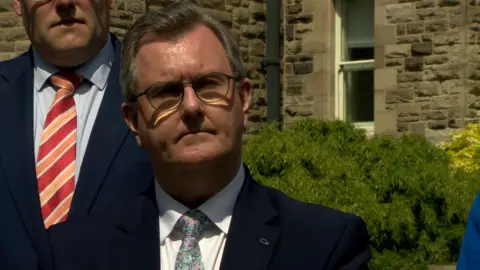
Stephen Farry from Stormont's third-largest party, the cross-community Alliance party, agreed it was a constructive meeting with parties committing themselves to work towards the restoration of Stormont.
He said a key aspect of that had to be requesting an extra £1bn from the Westminster government to "stem the bleeding" and stabilise public finances.


It's worth bearing in mind that the £1bn figure now being openly floated is a rough ballpark.
The parties haven't yet actually agreed on any final ask.
But Stormont sources say it reflects the scale of what is necessary to cover the £800m shortfall this year, plus outstanding pay deals for public sector workers, not to mention the t-word - transformation of services which already seems to be on the long finger.
Ultimately it will be up to the Treasury to agree to a collective ask put forward by the parties.
And we are told there are likely to be hefty strings attached.

Ulster Unionist Party leader Doug Beattie said it was a sombre meeting because of the predicament of Northern Ireland's governance and fiscal position, but he welcomed the "workman-like" attitude from all parties.
Punishment budget accusation
Stormont officials believe they will need to find £800m in cuts and revenue-raising measures in the wake of last month's budget announcement which was set by Northern Ireland Secretary Chris Heaton-Harris.
The task fell to Mr Heaton-Harris in the absence of a functioning Northern Ireland Executive.
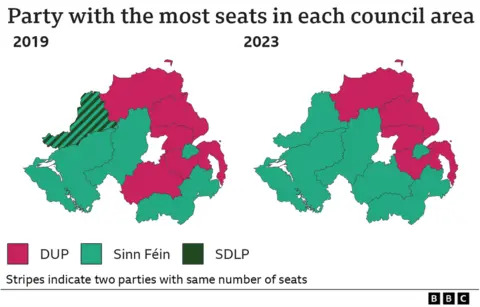
Mr Heaton-Harris, who has denied setting a "punishment budget", has warned that government departments face difficult decisions "in order to live within the funding available".
The NI secretary said he was in close contact with parties about doing everything possible to lead to the restoration of the executive.
However, speaking after meeting with him on Wednesday, Michelle O'Neill said she didn't believe there was any urgency on his part.
Mr Heaton-Harris has refused to be drawn on a claim a restored Northern Ireland Executive needs an extra £1.1bn.
However, he said he was "very pleased to hear the parties are talking about the future".
He also said Ms O'Neill was "completely wrong" to claim he was showing no urgency to get devolved government restored.
On Thursday, Mr Heaton-Harris State met with the joint secretaries of the health trade unions to discuss the Northern Ireland budget for this financial year and the impact on the health service.
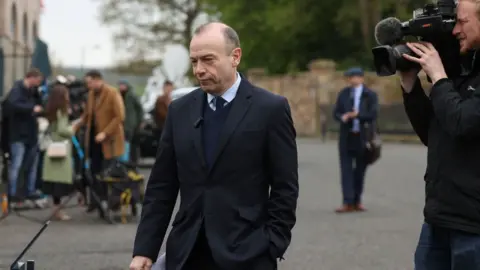 PA Media
PA MediaThe Northern Ireland Office (NIO) said he also offered clarity on the pay offer that was made to health workers in England and Wales earlier this month.
"Ultimately this is a matter for the trade unions and the Department of Health in Northern Ireland," a NIO spokesperson said.
"The Secretary of State has no authority to negotiate pay in Northern Ireland.
"Stable and accountable local government is the best way of delivering on the issues that matter most to the people of Northern Ireland, such as the health service.
"That is why the government's focus remains on restoring the Executive."
On Thursday, it was announced that a shortage of consultants at Daisy Hill Hospital in Newry means delivering inpatient care in general medicine is no longer sustainable.
The Southern Health Trust said it was working with other trusts in Northern Ireland and the Department of Health "to help us through this situation".
Major decisions
In her letter to Sinn Féin, the DUP, the Alliance Party and the Ulster Unionist Party (UUP) Ms Brady wrote that only elected ministers can take "major policy decisions", some of which are required for departments to make savings in the budget for 2023-24.
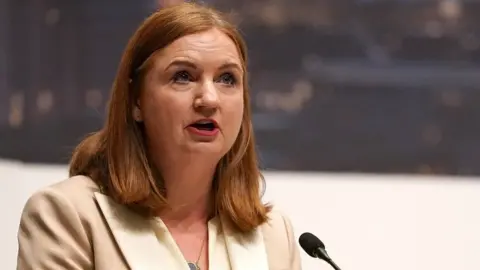 Reuters
ReutersHer letter warned that "leaves the accounting officer in the invidious position of having no lawful means to ensure full compliance with the duty to remain within budget limits".
"As a result, the spending trajectory currently exceeds the budget, and this will remain the case until and unless ministerial decision-making is restored," it added.
Ms Brady went on to emphasise that even if an executive was formed and accompanied by an additional financial package from Westminster, it was still "highly likely" that the budgetary position will remain very challenging.
"An incoming executive would be faced with a series of choices, made all the more challenging because they would fall to be taken part way through the financial year," she added.
'Monumental endorsement'
Following the council election Michelle O'Neill said the onus was on the British and Irish governments to focus efforts on the immediate restoration of the assembly.
Party leader Mary Lou McDonald said the election result was a "monumental endorsement" for Sinn Féin and the party now had a "huge mandate".
You can listen to the BBC's 5 Questions On, where Ireland Correspondent Chris Page explains the significance of the 2023 council election.


